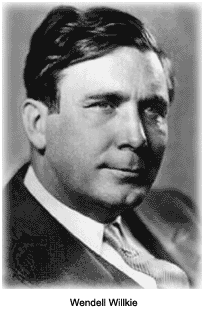Wendell Willkie was born in Elwood, Indiana, in 1892. He attended Indiana University and graduated in 1913, earning a B.A. He later went on to earn a law degree.
After Willkie earned his degree in 1917, the United States declared war on Germany. He entered the Army as an officer and rose to the rank of captain during his service. During his time in the Army he did not participate in any battle.
When Willkie left the service, he went to Ohio to begin a law practice. While in Ohio, he met Edith Wilk of Rushville, Indiana, and after a short courtship, they wed. Following that time in Ohio, the couple moved to New York City where he continued to practice law.
In 1933, Willkie became the president of the nation`s largest utilities holding company, the Commonwealth and Southern Corporation. He held that position until 1940.
 Originally a member of the Democratic Party, Willkie was nevertheless a strong opponent of much of President Franklin D. Roosevelt`s New Deal. He also was strongly against the Tennessee Valley Authority (TVA), the vast project that eventually brought electricity to thousands of people, controlled the Tennessee River flood waters, improved navigation, and introduced modern agricultural techniques. Given his adamant feelings about the New Deal and the TVA, Willkie eventually decided to become a Republican.
In the years after that decision, he rose in the ranks to become an influential member of the party. In 1940, the Republican Party chose Willkie over Thomas E. Dewey as their presidential candidate. To capitalize on strong isolationist sentiment in the country, Willkie`s principal campaign theme was opposition to U.S. involvement in World War II. It was a delicate balancing act, since at the time popular support for the European democracies was rising. Willkie tried to take the position that the defense of overseas democracies was in American interests but gratuitously offending the dictators and provoking them was not. It was a difficult line to explain.
Another of his major campaign strategies was to attack the New Deal, arguing that it was inefficient and wasteful. In the end, however, the president beat Willkie. The votes were 27,244,160 for Roosevelt and 22,305,198 for Willkie.
Although Roosevelt was victorious, he still expressed much respect for his former opponent. Willkie was actually an idealistic internationalist. After the Pearl Harbor Attack of December 1941 Roosevelt appointed Willkie to be a special representative for the United States. He made around-the-world visits to soldiers on the fronts and also played an active role in the American committee for Russian War Relief.
During the summer of 1942, Willkie left on a world tour that would carry him to the Middle East, the Soviet Union and China. On his return, he gave a radio address that was so well received, he produced a book on the same themes, which he entitled, One World. After describing the thirteen countries he had visited and the reception he had received, he wrote:
Originally a member of the Democratic Party, Willkie was nevertheless a strong opponent of much of President Franklin D. Roosevelt`s New Deal. He also was strongly against the Tennessee Valley Authority (TVA), the vast project that eventually brought electricity to thousands of people, controlled the Tennessee River flood waters, improved navigation, and introduced modern agricultural techniques. Given his adamant feelings about the New Deal and the TVA, Willkie eventually decided to become a Republican.
In the years after that decision, he rose in the ranks to become an influential member of the party. In 1940, the Republican Party chose Willkie over Thomas E. Dewey as their presidential candidate. To capitalize on strong isolationist sentiment in the country, Willkie`s principal campaign theme was opposition to U.S. involvement in World War II. It was a delicate balancing act, since at the time popular support for the European democracies was rising. Willkie tried to take the position that the defense of overseas democracies was in American interests but gratuitously offending the dictators and provoking them was not. It was a difficult line to explain.
Another of his major campaign strategies was to attack the New Deal, arguing that it was inefficient and wasteful. In the end, however, the president beat Willkie. The votes were 27,244,160 for Roosevelt and 22,305,198 for Willkie.
Although Roosevelt was victorious, he still expressed much respect for his former opponent. Willkie was actually an idealistic internationalist. After the Pearl Harbor Attack of December 1941 Roosevelt appointed Willkie to be a special representative for the United States. He made around-the-world visits to soldiers on the fronts and also played an active role in the American committee for Russian War Relief.
During the summer of 1942, Willkie left on a world tour that would carry him to the Middle East, the Soviet Union and China. On his return, he gave a radio address that was so well received, he produced a book on the same themes, which he entitled, One World. After describing the thirteen countries he had visited and the reception he had received, he wrote:
They all want the United Nations to win the war. They all want a chance at the end of the war to live in liberty and independence. They all doubt, in varying degree, the readiness of the leading democracies of the world to stand up and becounted for freedom for others after the war is over. This doubt kills their enthusiastic participation on our side.While the book became a best seller, Willkie did not live to see the postwar world he envisioned. Wendell Willkie died at the age of 52 from coronary thrombosis, on October 8th, 1944.